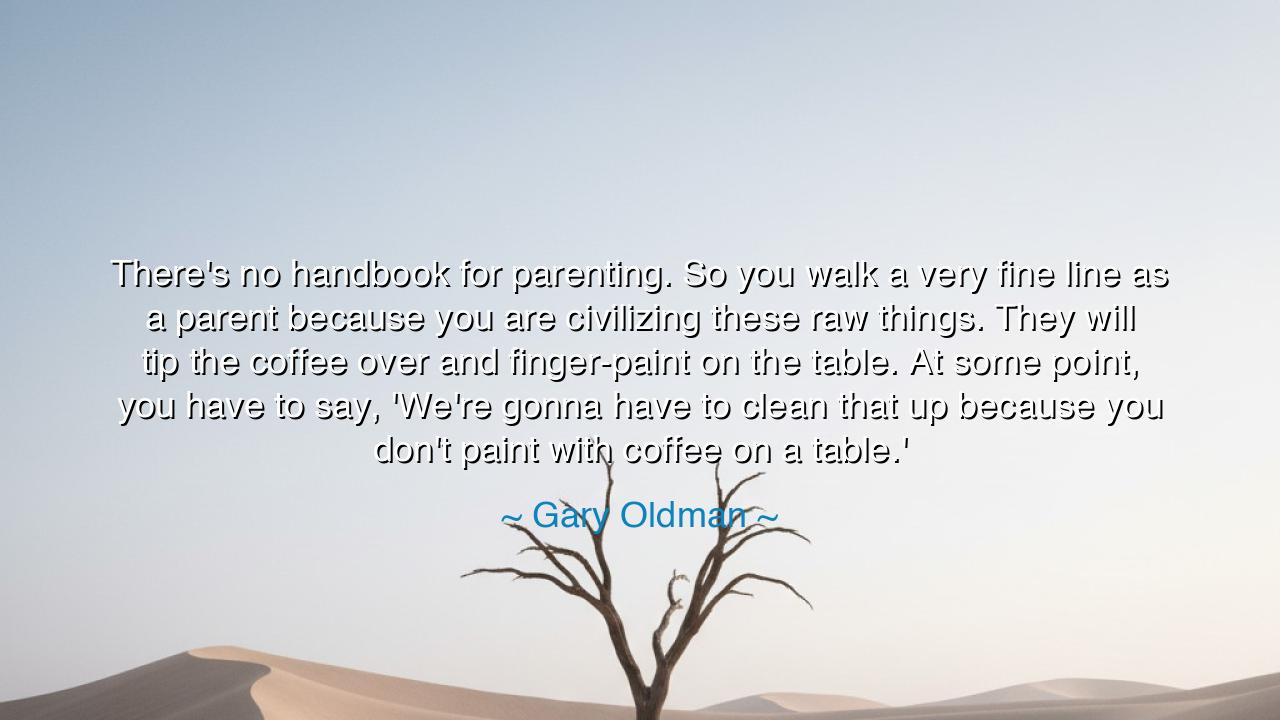
There's no handbook for parenting. So you walk a very fine line
There's no handbook for parenting. So you walk a very fine line as a parent because you are civilizing these raw things. They will tip the coffee over and finger-paint on the table. At some point, you have to say, 'We're gonna have to clean that up because you don't paint with coffee on a table.'






The words of Gary Oldman are both humorous and profound: “There's no handbook for parenting. So you walk a very fine line as a parent because you are civilizing these raw things. They will tip the coffee over and finger-paint on the table. At some point, you have to say, 'We're gonna have to clean that up because you don't paint with coffee on a table.'” Though spoken lightly, these words reveal a deep truth: that parenting is the delicate balance between allowing the wild spirit of childhood to flourish and guiding it toward discipline, respect, and order.
The ancients knew this task well. They likened children to raw clay, unformed and brimming with possibility. The parent is the potter who shapes, yet cannot force the clay without breaking it. Too harsh a hand, and the vessel cracks; too gentle, and it never holds form. Oldman’s words capture this eternal paradox: the parent must civilize without crushing, guide without suffocating, correct without extinguishing the fire of curiosity.
His mention of spilled coffee and finger-painting is more than anecdote—it is symbolic. The child approaches the world as pure wonder, unbound by rules, seeing every surface as canvas, every object as tool. To them, painting with coffee is not rebellion but discovery. Yet the parent’s role is to slowly awaken them to the laws of living, to the shared order of family and society. It is here the “fine line” emerges: how to correct without shaming, how to guide without breaking the joy of exploration.
History offers a vivid mirror of this truth in the life of Jean-Jacques Rousseau. In his treatise Émile, he argued that children must be allowed freedom to explore, to err, to learn by experience, rather than being crushed by rigid rules too early. And yet, he admitted, there must come a moment when the parent steps in, gently saying, as Oldman does, “We’re going to have to clean that up.” Civilization must be taught, but not at the expense of the child’s spirit.
Oldman’s wisdom also strikes at the heart of why parenting feels so uncertain: there is no handbook. Each child is unique, each parent untrained, and each family a different landscape of trials and triumphs. What works for one may fail for another. Thus, the parent walks by trial and error, by patience and reflection, trusting intuition more than manuals, love more than technique. This humility is itself a form of wisdom: to admit there is no perfect way is to free oneself to grow alongside the child.
The lesson here is both sobering and inspiring. Parents are not sculpting angels, but civilizing wild and radiant beings whose energy is both a gift and a challenge. Do not despise the spills, the messes, the chaotic creativity—they are proof of life bursting forth. But neither should you neglect the sacred duty of guiding them toward order, responsibility, and respect. The fine line is walked daily, in countless small choices that slowly shape the adult the child will become.
Practically, this means setting boundaries with kindness. When chaos erupts, respond not with wrath, but with gentle firmness: “We must clean this up.” Teach responsibility through action, not humiliation. Celebrate creativity, but also introduce respect for tools, spaces, and people. Above all, remember that you are not raising children to remain children, but to become adults who can carry their wonder into a structured world.
Thus, Gary Oldman’s words must be remembered: “There’s no handbook for parenting… you are civilizing these raw things.” Parenting is tough because it is holy work—the daily labor of guiding chaos into character, without extinguishing the flame of curiosity. It is not about erasing the wildness, but about shaping it into strength. And though no handbook exists, the compass of love, patience, and wisdom will always point the way.






AAdministratorAdministrator
Welcome, honored guests. Please leave a comment, we will respond soon